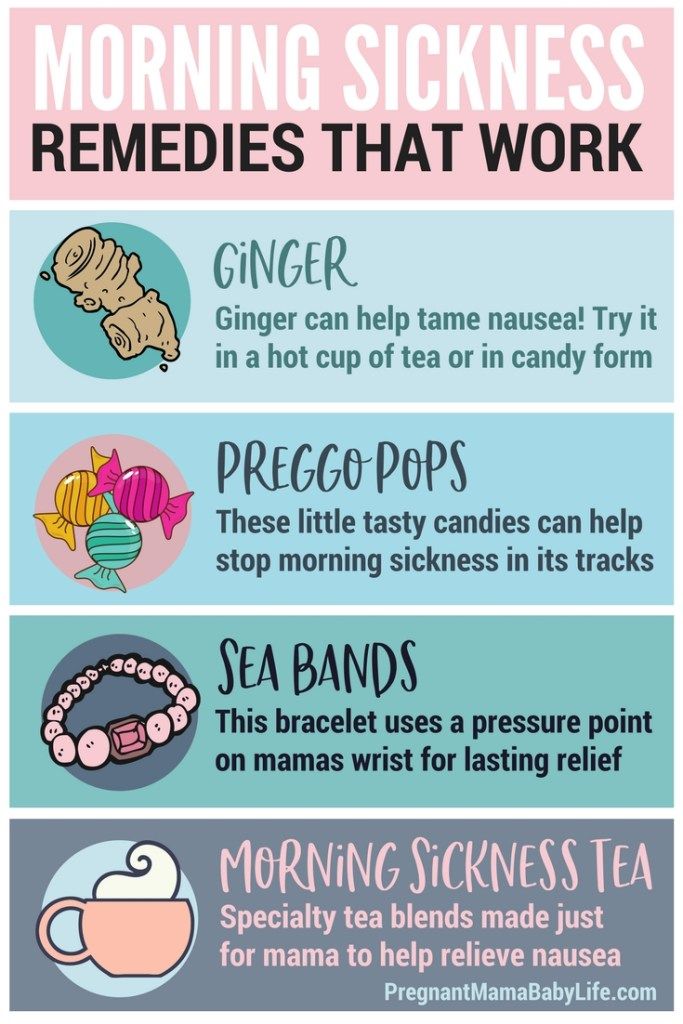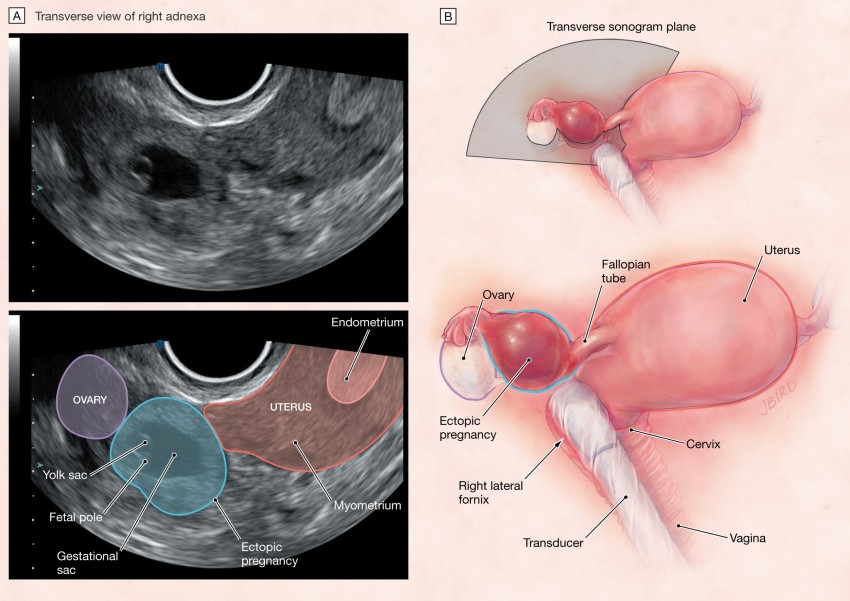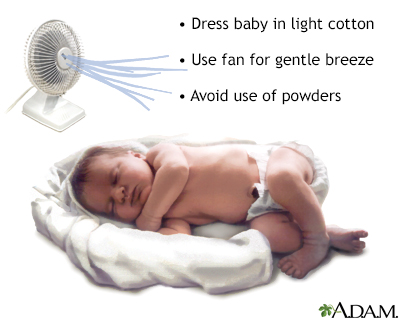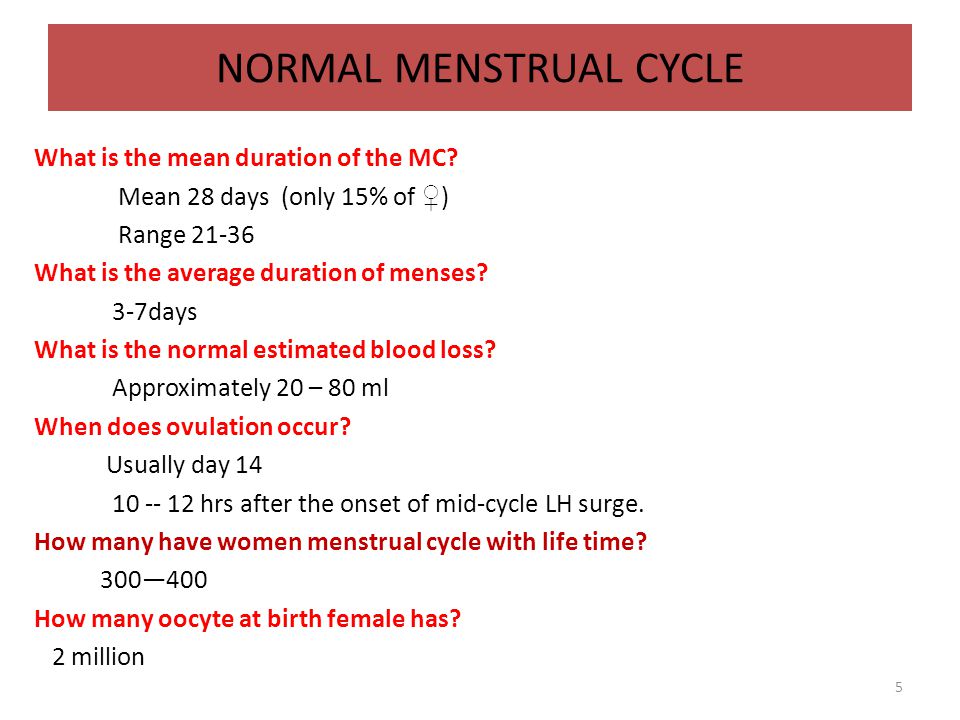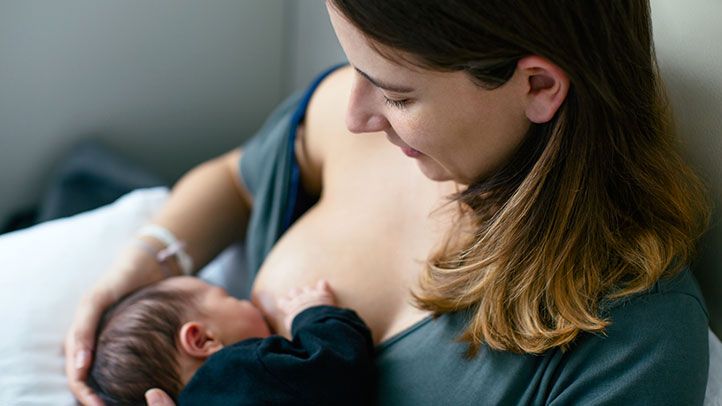How long is your 1st trimester of pregnancy
First Trimester Of Pregnancy: What To Expect
What is the first trimester of pregnancy?
Pregnancy has three trimesters or stages. Each trimester is about 13 weeks or three months long. A full-term pregnancy lasts 40 weeks or between nine and 10 months. Your healthcare provider will talk to you about fetal development in terms of weeks. Your first trimester of pregnancy lasts until the 13th week of pregnancy.
It may seem strange, but your pregnancy actually begins on the first day of your last menstrual period. This is called the gestational age of the pregnancy. A pregnancy care provider calculates your due date by adding 40 weeks to the first day of your last menstrual period. So this means, by the time you know you’re pregnant, you’re already about four weeks along. This can be very confusing!
Understanding weeks of pregnancy
The first two weeks of pregnancy are part of your normal menstrual cycle — the first week is your period and the second week is ovulation. Once you ovulate, your egg travels through your fallopian tube to your uterus. If it meets up with sperm, they combine and conception occurs (fertilization).
During the third week of pregnancy, the fertilized egg travels to your uterus. On its way down to your uterus, it divides into more cells. Once it reaches your uterus, it implants into your uterine lining. This triggers your body to recognize that you’re pregnant and a series of changes begin to happen. Most people miss their period and then get a positive pregnancy test.
How long is the first trimester?
The first trimester begins before you’re pregnant. It starts on the first day of your last menstrual period and goes until the 13th week of pregnancy.
What can I expect in my first trimester?
Your first trimester of pregnancy is full of many physical and emotional changes. It can be a very overwhelming time, and your mind may be racing with questions. Plus, your hormones are in overdrive. In fact, your body produces more estrogen during one pregnancy than it does during your entire life when you’re not pregnant.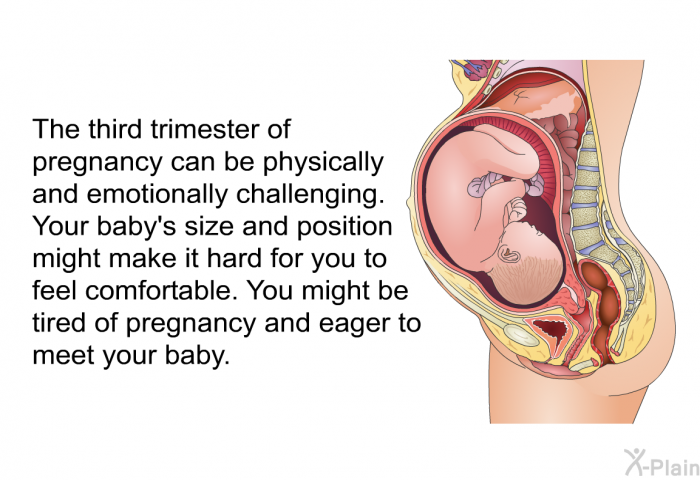 This surge in hormones can cause some unpleasant pregnancy symptoms. You may find yourself feeling moody, bloated and tired. While you may not see a prominent baby bump yet, your uterus is expanding and your blood volume is increasing.
This surge in hormones can cause some unpleasant pregnancy symptoms. You may find yourself feeling moody, bloated and tired. While you may not see a prominent baby bump yet, your uterus is expanding and your blood volume is increasing.
It’s OK to feel both excited and nervous. Talking to your friends, partner or a healthcare provider may help you feel better as you navigate your pregnancy journey.
What should I do in my first trimester?
Your first trimester is very important. You might not look or feel pregnant, but lots of changes are happening.
If you don’t have a healthcare provider or a pregnancy care provider, you should find one as soon as possible. Getting early pregnancy care can help you avoid any potential complications. Make a list of questions or concerns you have so you’re ready for your first appointment. Check with your health insurance about pregnancy coverage so you know what to expect and where you can get care. If you don’t have health insurance, there are programs and agencies to help you get prenatal care.
There are different types of pregnancy care providers that take care of you during pregnancy, labor, delivery and postpartum. These include obstetricians, midwives, and sometimes, primary care physicians. In addition to selecting a pregnancy care provider, you may also consider places to deliver your baby. While most people choose to give birth in a hospital, some people prefer birthing centers or home births.
Now is a great time to think about your overall health and what lifestyle changes you may need to make now that you’re pregnant. For example, think about how pregnancy affects your work, finances, habits and daily activities.
How does the fetus develop in the first trimester of pregnancy?
Several developments occur in the first trimester. Although you can’t see it happening, there’s a lot going on inside your body after sperm fertilizes an egg.
Weeks one to four of pregnancy
During the first month of pregnancy, several important structures form.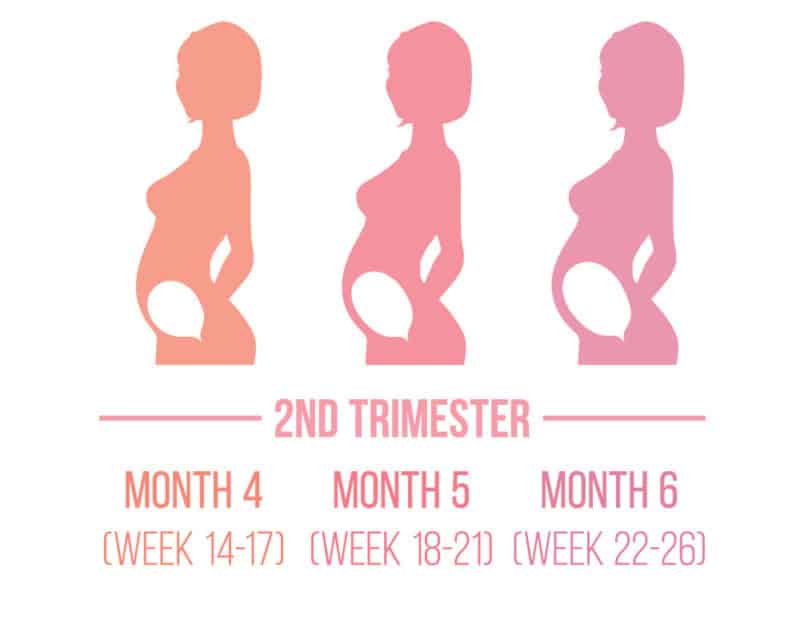 These structures are a tiny clump of cells, but will grow to become the amniotic sac, placenta and umbilical cord. A tube that becomes the fetus’s brain and spinal cord forms, as well as its circulatory system. A face, circles for eyes and the beginning of a mouth take shape.
These structures are a tiny clump of cells, but will grow to become the amniotic sac, placenta and umbilical cord. A tube that becomes the fetus’s brain and spinal cord forms, as well as its circulatory system. A face, circles for eyes and the beginning of a mouth take shape.
The embryo is about a quarter-inch inch long — smaller than a grain of rice.
Weeks five to eight of pregnancy
Several major organs begin to develop during the sixth week of pregnancy including the fetal lungs, heart, ears, arms and legs. Bones begin to replace tissue. Its head is large in proportion to the rest of its body, but it look more human now. The fetus has a distinct mouth, nose and face. Some providers do an early ultrasound to confirm a heartbeat during this time.
By the end of the eighth week of pregnancy, the embryo becomes a fetus. It’s about 1 inch long or the size of a raspberry.
Weeks nine to 12 of pregnancy
Towards the end of your first trimester, the fetus will have toes, fingers and nails. It will start to move by opening and closings its hands and mouth. The fetus’s urinary and digestive systems are also fully functioning. At around 12 weeks of pregnancy, your provider can listen to the fetal heart using a Doppler ultrasound. It also has either a vagina or a penis at this point (though your provider can’t see it on an ultrasound).
It will start to move by opening and closings its hands and mouth. The fetus’s urinary and digestive systems are also fully functioning. At around 12 weeks of pregnancy, your provider can listen to the fetal heart using a Doppler ultrasound. It also has either a vagina or a penis at this point (though your provider can’t see it on an ultrasound).
By the end of the 12th week of pregnancy, the fetus is between 3 and 4 inches long — about the size of a plum. It weighs about 1 ounce.
Why is the first trimester of pregnancy so critical?
The first trimester is so important because most of the fetus’s major organs and body systems are developing. Toxins, harmful substances and infection can severely damage a fetus’s growth and development during this time. It could increase your baby’s risk of being born with a congenital disorder.
What are the most common symptoms during the first trimester?
Every person and every pregnancy is unique. An increase in hormones cause most pregnancy symptoms.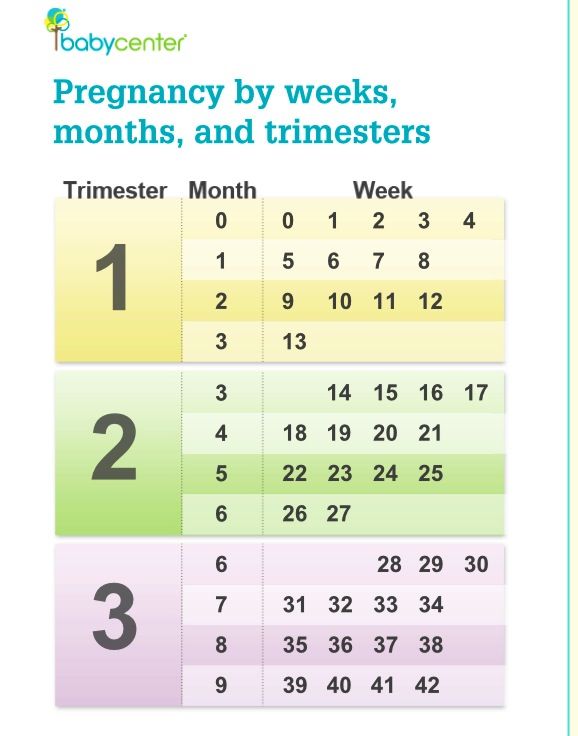 Some of the most common are:
Some of the most common are:
- Sore breasts: Hormones may make your breasts feel tender and large. It’s common to need bigger bras before the end of your first trimester. The veins in your breasts may become noticeable because they’re carrying more blood. Other changes to your breasts may include darkened areolas or changes to your nipples.
- Nausea: Morning sickness is one of the telltale signs of early pregnancy. Despite its name, it can last all day and all night. Try eating smaller meals or bland, low-fat foods. Some people find relief by eating foods containing ginger.
- Mood swings: The sudden rush of hormones may put you on a rollercoaster of emotions. You may alternate between feeling anxious or scared to excited or weepy within a span of 30 minutes. It may be helpful to talk through your feelings with a friend or your partner.
- Feeling tired: Your body is hard at work during the first trimester of pregnancy.
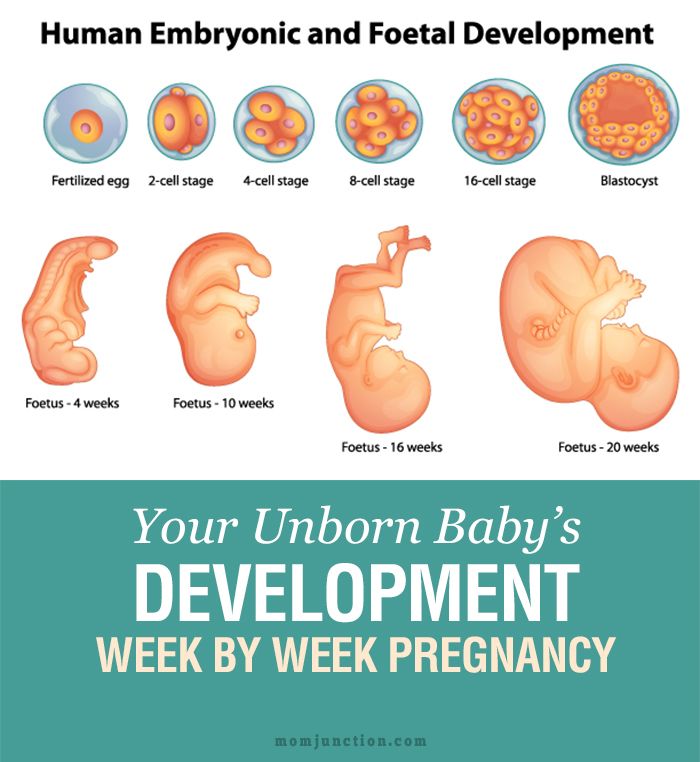 This may leave you feeling exceptionally tired. Be sure to get plenty of rest. Most people get some energy back in the second trimester.
This may leave you feeling exceptionally tired. Be sure to get plenty of rest. Most people get some energy back in the second trimester. - Needing to pee: Your uterus begins to grow to support the pregnancy. It may begin pressing on your bladder, causing you to need to pee more often.
- Acne or other skin changes: Hormones cause your skin to create more oil during pregnancy. This can lead to clogged pores and acne in some people. There are other skin conditions that appear during pregnancy, but most appear in the second or third trimesters.
- Mild shortness of breath: You may feel short of breath with light physical activity.
Your heart is pumping more blood during pregnancy. This means your pulse may be quicker and you may find yourself losing energy more easily. Be mindful of how much demand pregnancy puts on your body and take rests when you feel tired or out of breath.
What tests will I have in the first trimester of pregnancy?
Checkups, screenings and other tests during pregnancy help keep you and the fetus healthy.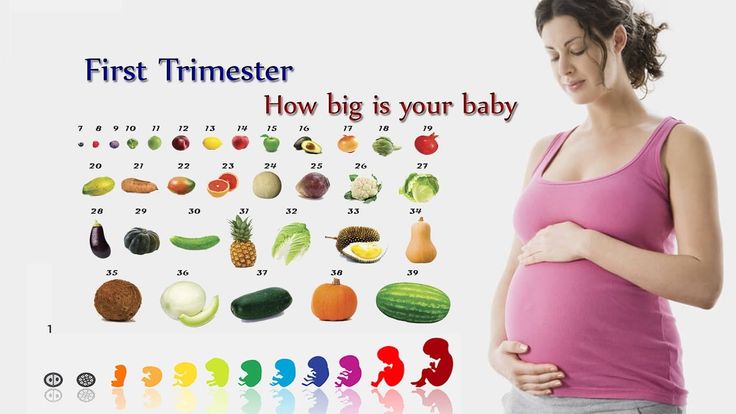 Care during pregnancy is commonly referred to as prenatal care. Prenatal care appointments are important because your pregnancy care provider discusses what you can expect during pregnancy and delivery, performs checkups and screenings and answers any questions you have.
Care during pregnancy is commonly referred to as prenatal care. Prenatal care appointments are important because your pregnancy care provider discusses what you can expect during pregnancy and delivery, performs checkups and screenings and answers any questions you have.
Your first prenatal visit
You’ll have between two and three prenatal visits during your first trimester. This can vary depending on your provider or if you’re a high-risk pregnancy. You can expect to discuss your personal medical history, gynecological and obstetrical history (prior pregnancies and births), as well any family medical history that may affect your pregnancy. This visit is very thorough to make sure you and the growing fetus are healthy.
At your first prenatal visit your provider will calculate your due date. You can also expect them to perform the following:
- A physical exam, including checking your weight and blood pressure.
- A pelvic exam.
- A Pap test (if you’re due for one).

- Tests to check for certain sexually transmitted infections (STIs).
- Check your pee for bacteria, protein and glucose (sugar).
- Order blood tests to check hormone levels, Rh factor, iron levels and certain diseases.
- Check the fetal heart rate.
Some providers use transvaginal ultrasound at your first appointment to confirm pregnancy and measure the fetal heart rate and size. This ultrasound also shows if you’re expecting multiples. A transvaginal ultrasound involves your provider placing a wand inside your vagina. Most pregnant people are offered at least one ultrasound in their first trimester, but the exact timing varies depending on your provider. If you’re expecting multiples, you may be offered additional ultrasounds in your first trimester.
Your provider may suggest other screening tests during pregnancy. Screening tests identify if you or the fetus are at risk for certain health conditions. Based on the results of your screening, you may need diagnostic tests. Diagnostic tests confirm or rule out health problems. In the first trimester, your provider may suggest a screening to detect a higher risk of chromosomal disorders like Down syndrome. Talk to your provider about the screenings they recommend.
Diagnostic tests confirm or rule out health problems. In the first trimester, your provider may suggest a screening to detect a higher risk of chromosomal disorders like Down syndrome. Talk to your provider about the screenings they recommend.
What should I not do in the first trimester of pregnancy?
Once you find out you’re pregnant, it’s normal to have to make some lifestyle changes. These changes help ensure that everyone is healthy. You should avoid the following things during your first trimester of pregnancy:
- Alcohol.
- Cigarettes and tobacco.
- Recreational drugs like opioids.
- Contact sports like football or activities that put pressure on your abdomen.
- Foods like raw fish (sushi), fish high in mercury, uncooked or undercooked meats, lunchmeat and unpasteurized milk, cheese or juice.
- Hot tubs and saunas.
How do I take care of myself in the first trimester of pregnancy?
Staying healthy is important throughout all three trimesters of pregnancy.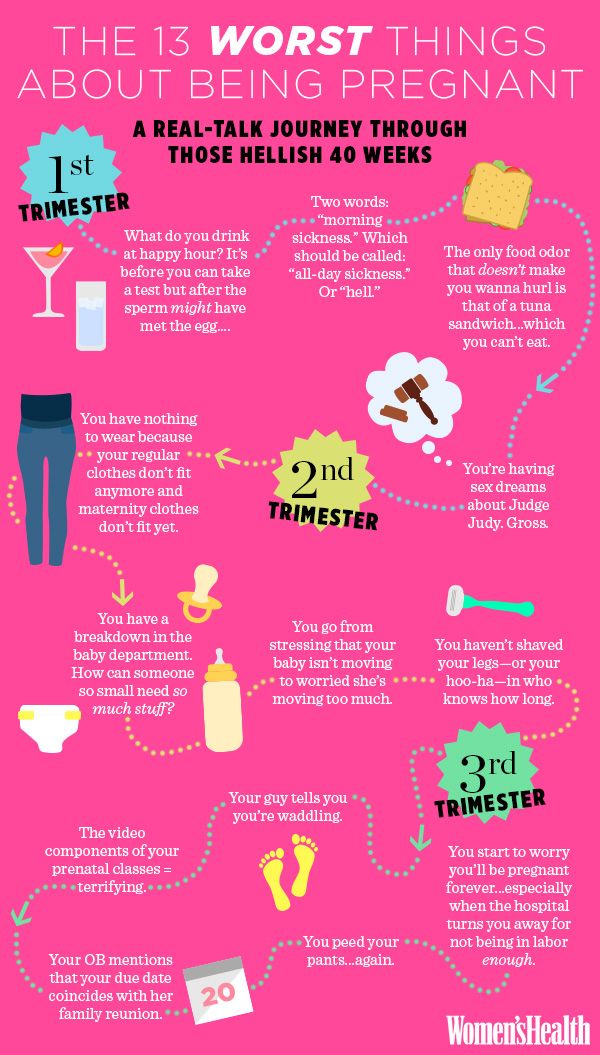 Here are some helpful tips on staying healthy during the first 13 weeks of pregnancy:
Here are some helpful tips on staying healthy during the first 13 weeks of pregnancy:
- Stay active as much as you can. Listen to your body and stop for rest if you feel any discomfort while exercising. You may need to modify your exercise routine during pregnancy.
- Take a prenatal vitamin containing folic acid.
- Eat a variety of healthy foods including fruits, vegetables, meat, eggs and whole grains.
- Get plenty of rest.
- Drink plenty of water.
- Attend all of your prenatal appointments.
Is it normal to bleed during the first trimester of pregnancy?
Light bleeding or spotting during pregnancy is usually OK in the first few weeks of pregnancy. Some people experience implantation bleeding (when a fertilized egg burrows unto your uterine lining). Call your pregnancy care provider if you’re bleeding heavily or the bleeding lasts more than one day.
What prenatal vitamin should I take?
The vitamins and minerals in your food (or in prenatal vitamins) help support the fetus as it grows and develops.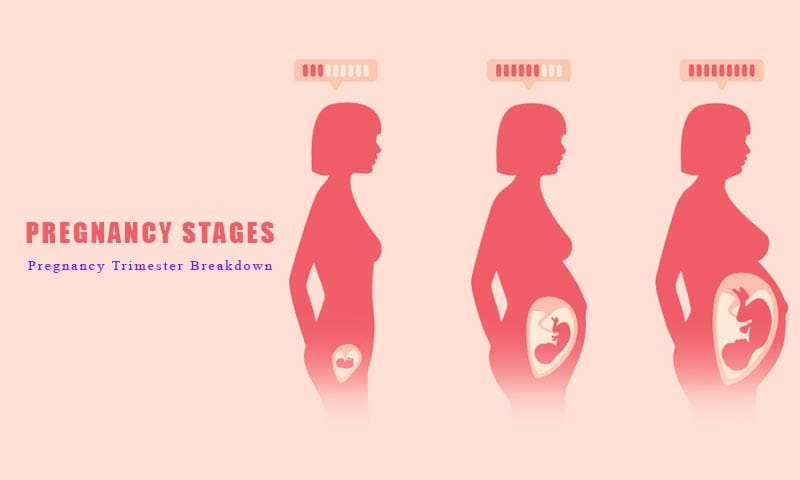 Most providers recommend taking a prenatal vitamin as soon as you begin trying to get pregnant. Vitamins containing folic acid, iron and calcium help support a healthy pregnancy. Talk to your provider if you’re unsure about which prenatal vitamin to take.
Most providers recommend taking a prenatal vitamin as soon as you begin trying to get pregnant. Vitamins containing folic acid, iron and calcium help support a healthy pregnancy. Talk to your provider if you’re unsure about which prenatal vitamin to take.
Can I drink caffeine during pregnancy?
Most healthcare providers recommend limiting caffeine consumption to under 200 milligrams per day during pregnancy. That’s about 12 ounces of coffee or three cans of Mtn Dew®. This is because a fetus can’t metabolize caffeine so it can build up in their body and cause complications.
When should I call my pregnancy care provider during the first trimester?
Call your provider right away if you have:
- A fever higher than 100.4 degrees Fahrenheit.
- Heavy bleeding or unusual vaginal discharge.
- Severe cramping in your belly, arms or legs or abdominal pain.
- Persistent vomiting and/or diarrhea.
- Fainting spells or dizziness.
- Swelling in your hands, fingers or face.
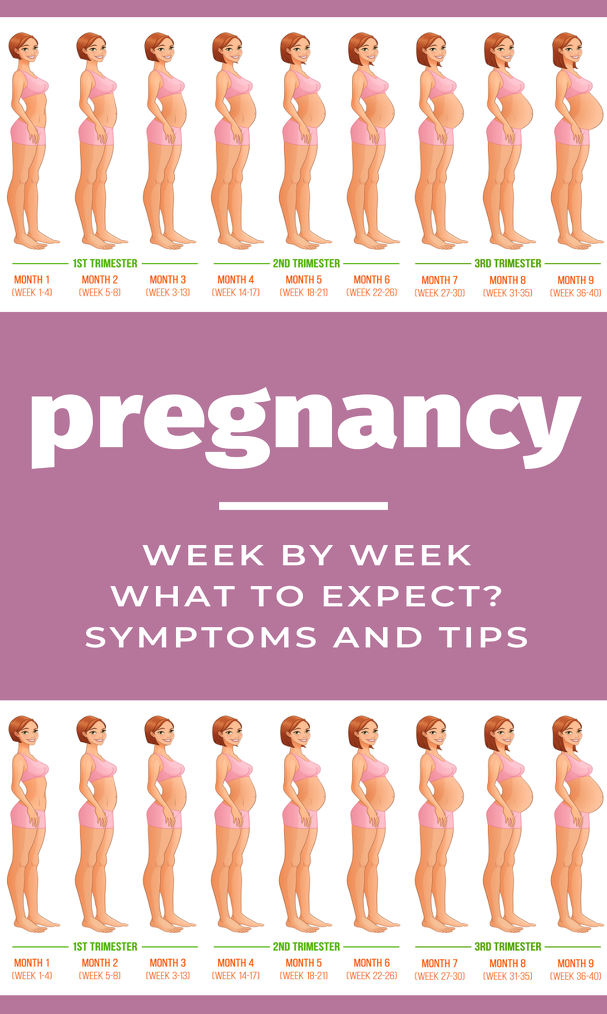
- Blurred vision or spots before your eyes.
A note from Cleveland Clinic
Pregnancy is an exciting, and sometimes scary, time in your life. You may feel overwhelmed with information and have lots of questions. During the first trimester of pregnancy, your body is growing and changing rapidly. The fetus is growing and developing, too. In fact, by the end of the first trimester, the fetus is the size of a lemon. You may begin having symptoms of pregnancy like nausea, sore breasts or needing to pee more often. Schedule an appointment with a pregnancy care provider as soon as you know you’re pregnant. Regular prenatal care is important so you and the fetus stay healthy and strong during pregnancy.
Everything you need to know about the first trimester (weeks 1 to 12)
Tommy's PregnancyHub
You’re pregnant: congratulations! The first weeks of your pregnancy are a vital time as your body gets busy building a baby. How exciting!
First trimester: key stages
The first trimester begins on the first day of your last period and lasts until the end of week 12. This means that by the time you know for sure you're pregnant, you might already be five or six weeks pregnant!
This means that by the time you know for sure you're pregnant, you might already be five or six weeks pregnant!
A lot happens during these first three months. The fertilised egg rapidly divides into layers of cells and implants in the wall of your womb where it carries on growing. These layers of cells become an embryo, which is what the baby is called at this stage.
During this trimester, your baby grows faster than at any other time. By six weeks, a heartbeat can usually be heard and by the end of week 12, your baby's bones, muscles and all the organs of the body have formed. At this point, your baby looks like a tiny human being and is now called a fetus. He or she will even be practising swallowing!
Try our Healthy Pregnancy Tool to find out everything you need to know about your pregnancy
When am I due?
Find out your due date using our due date calculator!
When will I see a midwife?
Your first midwife appointment (also known as antenatal appointment) is the 'booking' appointment. This usually happens between week 8 and 10 of your pregnancy. Find out how to register with a midwife and when your appointments will be here.
This usually happens between week 8 and 10 of your pregnancy. Find out how to register with a midwife and when your appointments will be here.
Keeping your baby safe
There are some things that you can do during pregnancy that have an effect on your baby. Find out about them by clicking the link below.
Find the complete list of pregnancy dos and don'ts (and reasons why) here
Not sure whether you are pregnant?
Find out about the symptoms that mean you may be pregnant here.
Your physical and mental health in pregnancy
We also have lots of useful tips for coping with everyday pregnancy niggles. It’s common for women to experience symptoms such as morning sickness, cramp and indigestion during the first trimester.
Don't forget that your mental health is just as important as your physical health. It's normal to feel some anxiety and stress but it shouldn't be ongoing. If what you’re feeling isn’t normal for you, talk to your GP or midwife about it.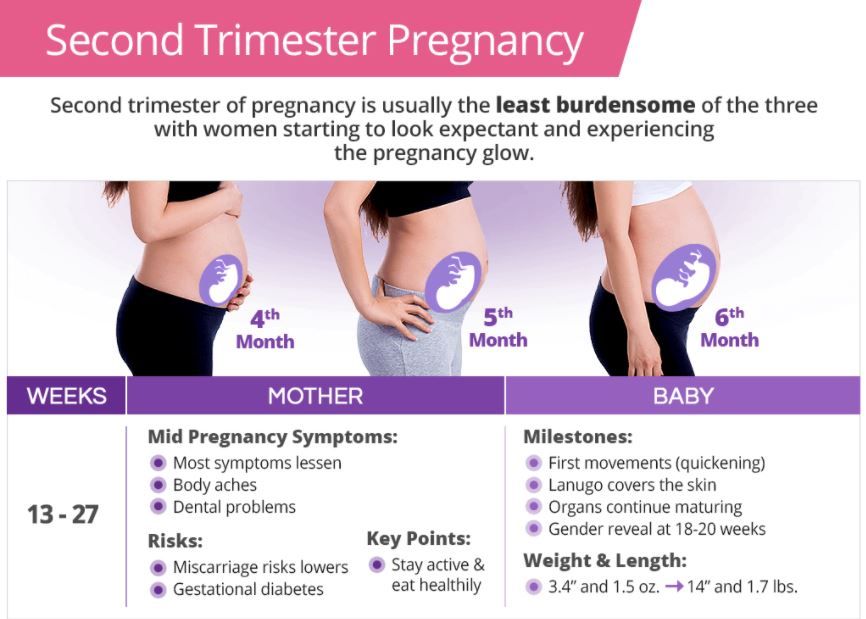 They are there to help.
They are there to help.
Exercise, such as yoga, has been shown to reduce anxiety and is a great way to stay active during your pregnancy, too.
Read more about mental wellbeing in pregnancy
Read more about diabetes and pregnancy
Read more about pregnancy with a high BMI
Read more about exercise and pregnancy
Read about the symptoms to look out for in pregnancy
Track your baby's development
Sign up to a free pregnancy email from our midwives to track your baby's development and give you reminders of all you need to know through the 9 months of pregnancy. Click here to sign up.
Review dates
Reviewed: 28 June 2018 | Next review: 28 June 2021
This content is currently being reviewed by our team. Updated information will be coming soon.
Back to top
1st trimester of pregnancy: what happens to the fetus
1st trimester of pregnancy: what happens to the fetus - Private maternity hospital Ekaterininskaya Clinics1st trimester: 1st-12th weeks
The gestational age is calculated from the first day of the last menstruation, since it is difficult to determine the exact day of conception.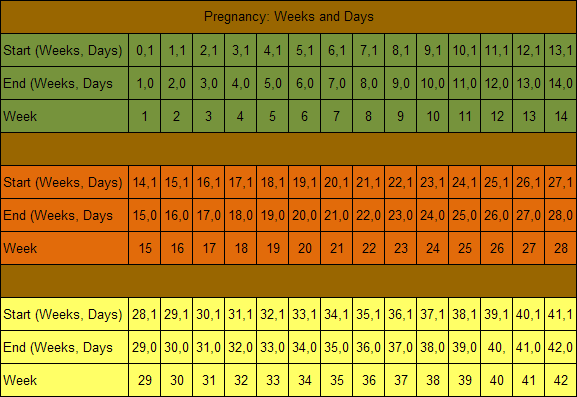 Since conception usually occurs in the middle of the menstrual cycle, you are not actually pregnant during the first two weeks, but this period is counted as the beginning of pregnancy. nine0005
Since conception usually occurs in the middle of the menstrual cycle, you are not actually pregnant during the first two weeks, but this period is counted as the beginning of pregnancy. nine0005
As soon as the fertilization of the egg takes place around the 3rd week, the hormones begin to produce changes in your body little by little. As a result, you may experience some of the following symptoms:
- Morning sickness. As a result of rising levels of hormones characteristic of pregnancy, up to 80% of women in the 1st trimester experience morning sickness with symptoms such as nausea and vomiting. The idea that such malaise is observed only in the morning is a common misconception. In fact, symptoms can appear at any time of the day or night. Up to 1 in 5 women experience morning sickness in the 2nd trimester of pregnancy and can sometimes persist throughout pregnancy. nine0002 If you experience morning sickness, avoid foods that make you sick, eat little and often, avoid fatty and spicy foods, drink more water.
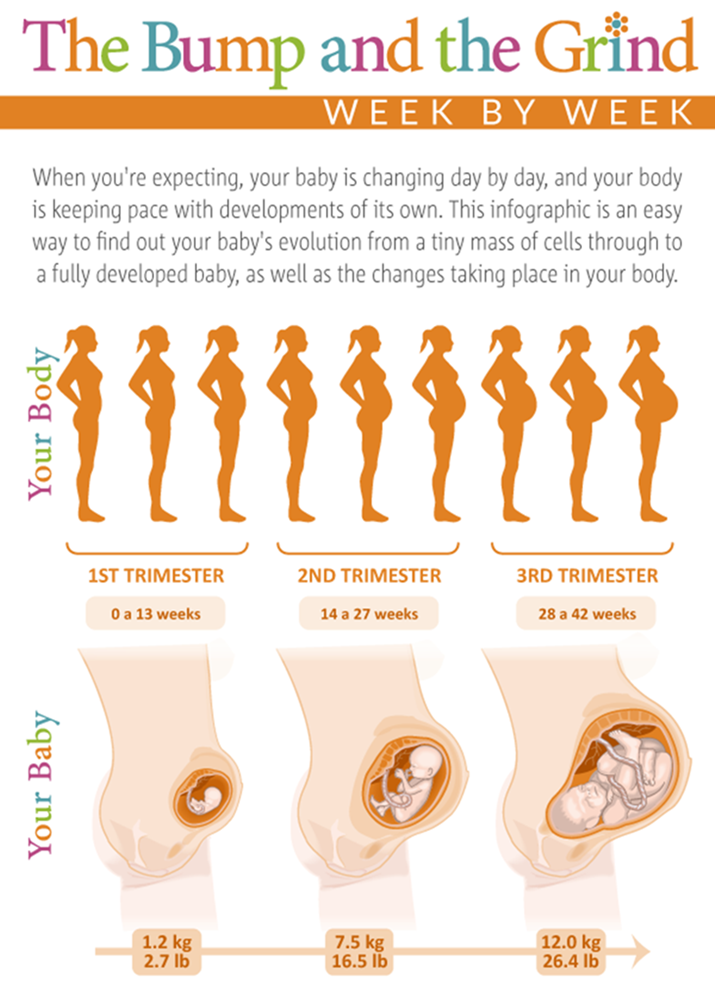 If you experience severe symptoms or symptoms that bother you, see your doctor.
If you experience severe symptoms or symptoms that bother you, see your doctor. - Breast changes. The mammary glands will begin to increase in size, soreness may appear. The nipples will increase in size, become darker and more protruding.
- Fatigue. High levels of the hormone progesterone can make you feel tired and sleepy. Rest as often as possible in a horizontal position with your legs up and eat as well as possible, which is not easy if you are experiencing morning sickness! nine0016
- Increased emotionality. A higher level of emotionality, manifested as a result of an increase in hormone levels, is normal. Understanding and patience on the part of your partner and loved ones is very important here.
- Food likes and dislikes. You may find yourself intolerant of one food and addicted to another. This is usually not a problem, unless you feel like eating weird foods like chalk.
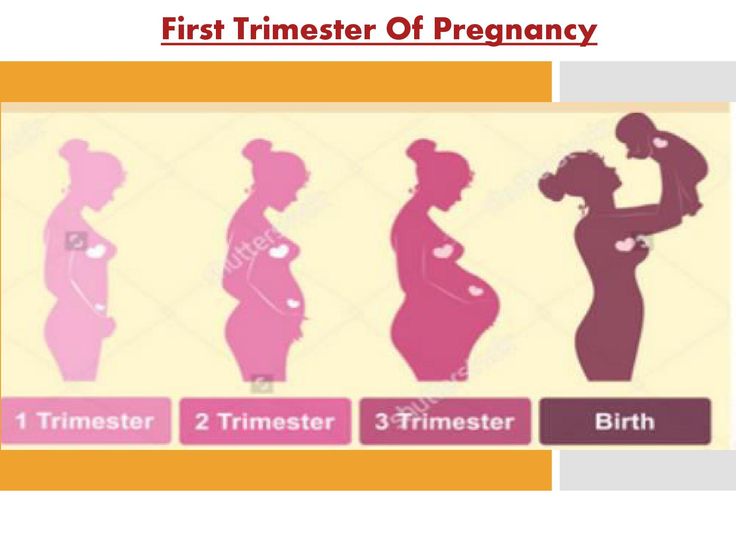 If you are concerned about the situation, contact your doctor. nine0016
If you are concerned about the situation, contact your doctor. nine0016 - Frequent urination. As your fluid levels increase and your uterus puts pressure on your bladder, you will become more likely to visit the toilet. Go to the toilet as soon as you feel the need - this minimizes the pressure on the bladder.
- Feeling of dizziness. Sometimes you may feel a little dizzy (this is due to hormonal changes). Try not to stay on your feet for a long time and slowly rise from a sitting or lying position. If you experience severe dizziness, contact your doctor immediately. nine0016
- Heartburn and constipation. Your digestive system will slow down to give you more time to digest your food. This can lead to heartburn and constipation. To help manage heartburn, try to eat small meals at regular intervals and avoid fried or spicy foods and carbonated drinks. Constipation is helped by eating a diet rich in fiber, maintaining physical activity and drinking plenty of water.
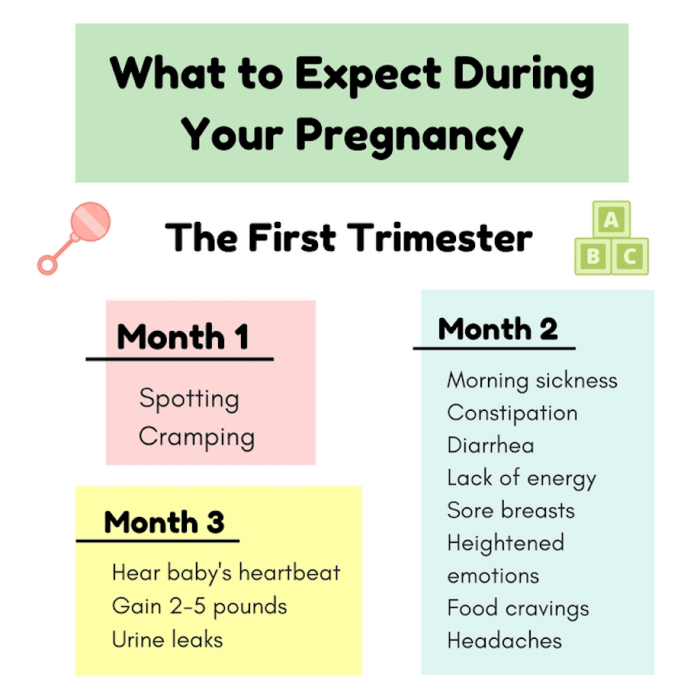 nine0045
nine0045 - Approximately 7 days after fertilization, the embryo implants in the uterine wall. The placenta, umbilical cord and amniotic sac will begin to form to provide nourishment and protection to the embryo.
- By the end of the first 12 weeks of pregnancy, the uterus is palpable through the wall of the abdomen, the abdomen will begin to grow.
- All the main organs of the baby are formed, the circulatory system works.
- The development of the sexual organs has begun.
- Fingers are formed on the hands and feet, nails have appeared.
- Facial features have formed.
- The length of the baby's body is about 6 cm from the head to the lower part of the body, he is already recognizable. The baby moves in the amniotic sac, but you don't feel it move yet.
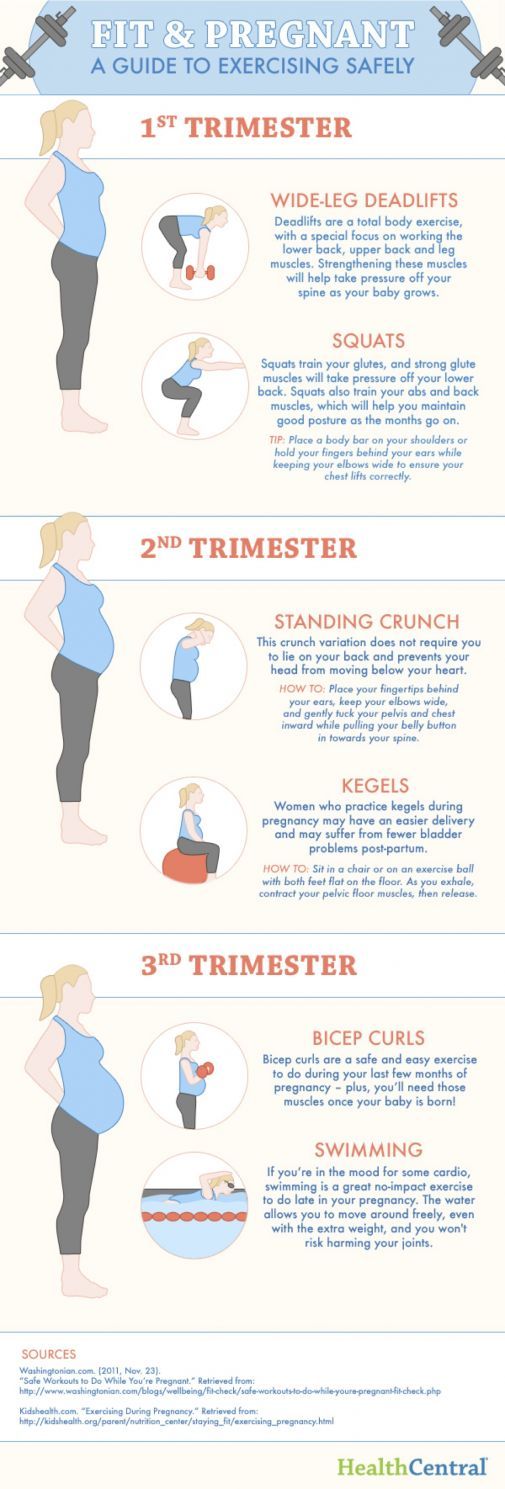
- Fetus. The weight gain of the fetus in the first trimester is negligible: at the end of the first trimester, it is actually the size of a peach.
- Expectant mother. Although the growth rate of the fetus is very subjective, the weight gain of the expectant mother by the end of the first three months should be about 1-2 kg.
 nine0016
nine0016 - check for any abnormalities in the growing embryo;
1st trimester milestones
Child development in the 1st trimester of pregnancy
By the end of the 1st trimester:
Clinic mobile app
You can make an appointment with a doctor, get tests
and much more...
Fill out the form to make an appointment or order a call back
I agree with personal data processing policy and user agreement I also give my consent to the processing of personal data.
Sign up for a consultation
I agree with personal data processing policy and user agreement I also give my consent to the processing of personal data. nine0005
By continuing to use rd.clinic23.ru, you agree to the use of cookies. How to ban the use of certain cookies can be found in Politics
1st trimester of pregnancy: everything you need to know | Mamovedia
The average gestation period is 40 weeks, counted from the date of the last menstrual period and measured in trimesters, months and weeks
The first trimester of covers the period from the 1st to the 12th week of pregnancy, which is approximately three months of the solar calendar. The second trimester starts at 13 weeks and ends at 27 weeks of pregnancy.
The second trimester starts at 13 weeks and ends at 27 weeks of pregnancy.
Finally, the third trimester covers the period from 28 weeks to the due date.
The first trimester of pregnancy is the most important for the development of your future baby.
During this period, the embryo (as the fetus of the first 8 weeks of life is defined) develops until it weighs from 14 to 28 grams, and growth, on average, from 7.5 to 10.5 centimeters. nine0077 Until the 20th week, the length of the embryo (and then the fetus) is usually measured from the head to the end of the spine. After that, its length is measured from head to toe.
The growth of the fetus in length will occur during the third, fourth and fifth months, and the increase in its weight will fall on the last two months of pregnancy.
What are the most common symptoms of pregnancy in the first trimester?
Usually the first symptoms accompanying pregnancy are nausea, vomiting, frequent urination, fatigue, breast tenderness .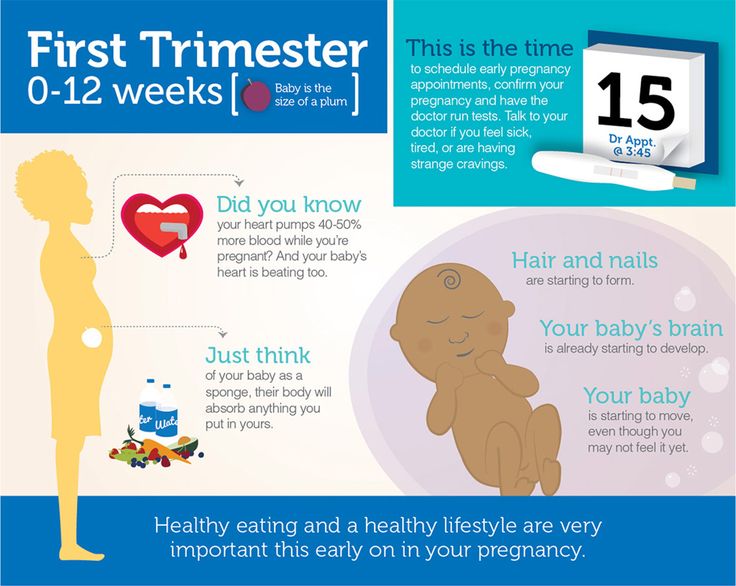 Many women begin to experience these symptoms even before a missed period or a positive pregnancy test result.
Many women begin to experience these symptoms even before a missed period or a positive pregnancy test result.
As your pregnancy progresses, you may begin to experience other symptoms such as mood swings, headaches, cramps, constipation, indigestion, bloating, food cravings or aversion, and an incredibly strong sense of smell: the latter often makes nausea worse.
Most of these symptoms, including mood swings and emotional outbursts, are believed to be caused by elevated levels of estrogen and progesterone. nine0077 If during this period you feel severe pain in the lower back, you have bleeding, severe nausea, it is recommended to consult a gynecologist, as these may be symptoms of a miscarriage.
First trimester weight gain
During the first three months of motherhood, you can follow your regular diet and you don't have to eat for two!
Examinations and screenings during this period
As soon as you know you are pregnant, schedule your first appointment with your OB/GYN. The first examination is usually never done before the 8th week of pregnancy unless there is a risk of complications such as a history of abortion or a family history of hereditary genetic diseases. This visit is required for:
Testing for HIV, syphilis, rubella, hepatitis B, as well as asymptomatic bacteriuria, chlamydia, toxoplasmosis is generally recommended for all women.
Ultrasonography as part of prenatal screening for genetic chromosomal risks should be performed between weeks 9 and 12 , along with a biochemical blood test for beta-hCG, PAPP-A and PIGF (optional) with a geneticist's conclusion.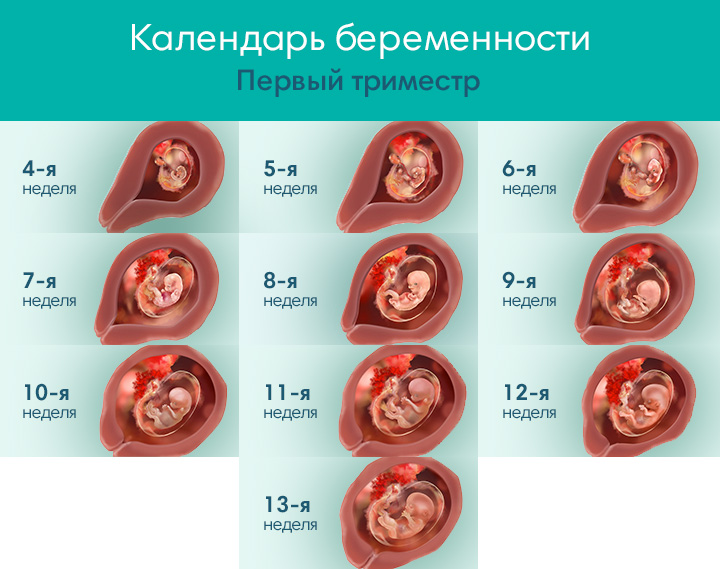 The woman must be informed of the abnormalities that may be found in order to have the choice of whether to continue the pregnancy or not.
The woman must be informed of the abnormalities that may be found in order to have the choice of whether to continue the pregnancy or not.
What does the baby look like in the 1st trimester?
At the end of the 1st month the embryo reaches the size from 2 to 5 millimeters . The heart and stomach are being formed in him, the sensory apparatus and the structure from which the nervous system will originate begin to develop. In addition, cavities for the eyes are formed and the very first sketches of future upper limbs appear. nine0005
By the end of the second month of embryonic development, the contours of the head and face begin to be drawn; nostrils, mouth, bronchi and lungs begin to form; brain grows; the very first sketches of the lower extremities appear; the upper limbs lengthen, acquiring the shape of a scoop. At this stage, the retina also begins to develop. At the end of the 2nd month, the embryo reaches a size of 2.3 centimeters and a weight of 15 grams .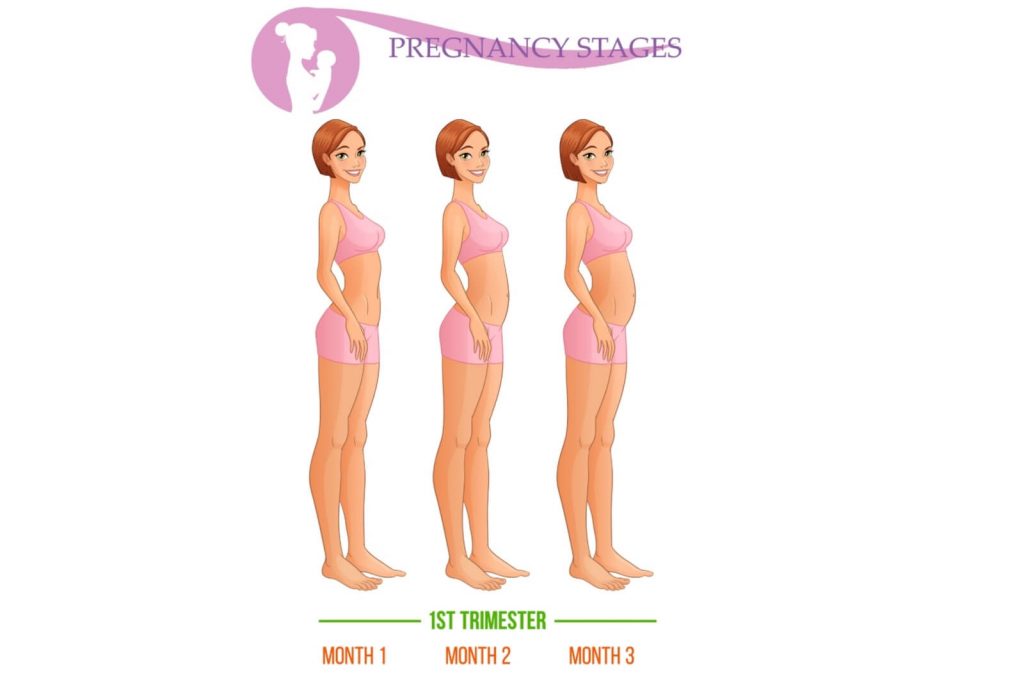 The heart of the embryo makes 110 beats per minute.
The heart of the embryo makes 110 beats per minute.
By the end of the third month, the elbows begin to bend, the eyelids and outer ear are defined, the corpus callosum appears in the brain between the two hemispheres, the formation of bones, nerves, muscles and great vessels continues. The growth of the body is observed. nine0077 Formed liver produces red blood cells and bile fluid; sketches of future external genital organs (penis in men; clitoris and labia majora in women) begin to develop, which is why it is possible to predict the future sex of the child at an early stage. Nails appear on the fingers; the intestine passes into the abdominal cavity; teeth are laid; the pancreas begins to produce insulin.
At the end of the 3rd month, the fetus measures 6.5 centimeters and weighs about 73 grams .
Things to remember in the 1st trimester of pregnancy
Most of the development of your unborn baby's nervous system occurs during the 1st trimester of pregnancy.



